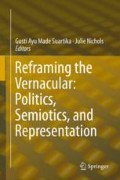Abstract
This paper makes the case for Landfill Vernacular – the hybrid style of construction that combines locally-sourced natural materials with objects reclaimed from waste, as demonstrated at Bantar Gebang landfill in West Java, Indonesia. This technique is used to build small homes and workplaces for the people working in the informal recycling industry. Utilising photographs and referencing existing literature the paper argues that within these humble dwellings reside the seeds of a potential contribution to making urban housing more affordable, particularly in informal settlements. The background for this research discusses the housing challenges facing low-income communities, with an emphasis on the situation in Jakarta. Next, the conditions in the waste picker villages at the landfill are described, and then argues that the neighbourhoods and buildings there represent an emerging vernacular. Next the paper introduces BGBJ, the social enterprise that the author has been involved with for the last 4 years. This project has attracted hundreds of international and domestic visitors and is currently establishing an upcycling workshop in the landfill to assist construction projects. The discussion involves the potential of waste as a construction material and expands on the opportunities to: (a) educate the next generation of vernacular builders, and (b) improve the quality of reclaimed material available for building. The conclusions drawn from the research suggest that landfill vernacular can be developed into a technique suitable to help other groups in need, such as refugees from natural or manmade disasters.
Access this chapter
Tax calculation will be finalised at checkout
Purchases are for personal use only
Notes
- 1.
BGBJ (Pronounced biji-biji) stands for Bantar Gebang: Biji. In Bahasa Indonesia Biji means seed and plurals are signified by repeating a word, so the name means “The seeds of Bantar Gebang”.
- 2.
Anyone interested in learning more about the BGBJ can like “The Kingdom of BGBJ” on Facebook, or search for BGBJ on YouTube, #BGBJ on Instagram, or visit our website at www.bgbj.org
References
Abrams, C.: Man’s struggle for shelter in an urbanizing world. MIT Press (1968).
UN-Habitat.: The Challenge of Slums – Global Report on Human Settlements. Earth scan Publications on behalf of UN-Habitat (2003).
Tunas, D., Peresthu, A.: The self-help housing in Indonesia: The only option for the poor? Habitat International, 34(3), 315–322 (2010).
Surahman, U., Higashi, O., Kubota, T.: Evaluation of current material stock and future demolition waste for urban residential buildings in Jakarta and Bandung, Indonesia: embodied energy and CO2 emission analysis. Journal of Material Cycles and Waste Management 19(2), 657–675 (2017).
Silver, C.: Planning the megacity: Jakarta in the twentieth century. Planning the Megacity: Jakarta in the Twentieth Century (2007).
Kusno, A.: The green governmentality in an Indonesian metropolis. Singapore Journal of Tropical Geography 32(3), 314–331 (2011).
UN: Agenda 21: Earth Summit - The United Nations Programme of Action from Rio. United Nations Conference on Environment and Development UNCED or the Earth Summit Rio de Janeiro Brazil 1992 (1993).
Satterthwaite, D.: Getting land for housing; what strategies work for low-income groups? Environment and Urbanization 21(2), 299–307 (2009).
Millar, K.M.: Reclaiming the Discarded: Life and Labor on Rio’s Garbage Dump. Duke University Press (2018).
Godden-Bryson, C.: Waste Pickers in Asia: Contesting value and values. In Recycling Cities (pp. 107–146) (2011).
Edwards, B.: Rough Guide to Sustainability A Design Primer. Futures (2010).
Vellinga, M.: Anthropology and the challenges of sustainable architecture. Anthropology Today 21(3), 3–7 (2005).
Heath, K.W.: Defining the nature of vernacular. Material Culture 20(2/3), pp. 1–8 (1988).
Jackson, J.B.: Urban circumstances. Design Quarterly (128), pp. 1–31 (1985).
Mitcham, C.: Thinking Re-Vernacular Building, 21(1), 32–40 (2005).
Harkness, R.: Earthships. Anthropology Now 3(1), 54–65 (2011).
Freney, M., Soebarto, V., Williamson, T.: Earthship monitoring and thermal simulation. Architectural Science Review 56(3), 208–219 (2013).
Mungkung, R., Intrachooto, S., Nudchanate, T., Sorakon, K.: Global Initiative on UPCYCLE Carbon Footprint Certification and Label Systems for Creative Waste Management and Greenhouse Gas Reduction. In M. Matsumoto, K. Masui, S. Fukushige, & S. Kondoh (Eds.), Sustainability Through Innovation in Product Life Cycle Design (pp. 551–563). Springer Singapore, Singapore (2017).
Bredenoord, J., van Lindert, P.: Pro-poor housing policies: Rethinking the potential of assisted self-help housing. Habitat International 34(3), 278–287 (2010).
Author information
Authors and Affiliations
Corresponding author
Editor information
Editors and Affiliations
Rights and permissions
Copyright information
© 2020 Springer Nature Switzerland AG
About this paper
Cite this paper
Devlin, J. (2020). Landfill Vernacular. In: Suartika, G., Nichols, J. (eds) Reframing the Vernacular: Politics, Semiotics, and Representation. Springer, Cham. https://doi.org/10.1007/978-3-030-22448-6_2
Download citation
DOI: https://doi.org/10.1007/978-3-030-22448-6_2
Published:
Publisher Name: Springer, Cham
Print ISBN: 978-3-030-22447-9
Online ISBN: 978-3-030-22448-6
eBook Packages: Earth and Environmental ScienceEarth and Environmental Science (R0)

